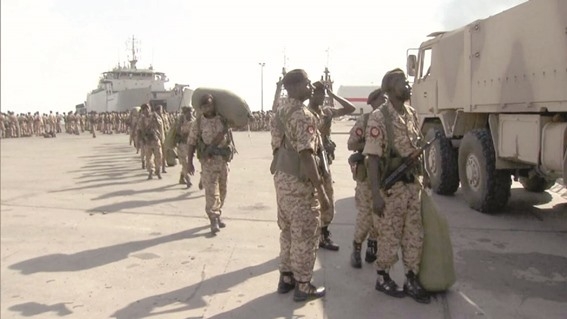Hundreds of Sudanese forces have reportedly entered Saudi Arabia en route to Yemen contrary to an earlier announcement by the North African country about a drawdown of its personnel in the bloody Saudi war on the poorest Arabian Peninsula nation.
Citing private Saudi sources, the Middle East Eye news portal (MEE) reported on Friday that 1,018 Sudanese army officers and soldiers arrived in Saudi Arabia by boat on September 22 after passing through passport control in the southwestern city of Jizan.
Two Sudanese planes also carried Sudanese military personnel from Khartoum to Saudi Arabia's Najran airport the day before, according to one of the sources, who was speaking on condition of anonymity.
The first plane held 123 passengers and the second 128, the source said, adding that both planes later departed for Khartoum.
"The planes brought Sudanese officers and soldiers to take part in Operation Restoring Hope," the source said, using the name that Saudi Arabia gave to its devastating military aggression against Yemen.
The fresh deployment came despite an announcement by the Sudanese military in January that it was winding down its presence in Yemen from around 5,000 mercenaries to a “minor” group of some 650.
Brigadier General Jamal Adam, a spokesman for the Rapid Support Forces (RSF) paramilitary, told Turkey’s Anadolu news agency that the Sudanese forces present in Yemen “were operating within two sections, the Emirates sector inside Aden, and the Saudi sector that extends on the Saudi-Yemeni border.”
In December 2019, Sudanese Prime Minister Abdalla Hamdok said the number of the Sudanese mercenaries had been reduced to 5,000 from 15,000.
He said his government had "inherited" the deployment in Yemen from Sudan's former president, Omar Hassan al-Bashir, who was ousted following a popular uprising against his rule in April 2019.
Earlier reports said child soldiers from Sudan's Darfur have been fighting on behalf of Saudi Arabia and its allies in the frontline of the Yemen war, with money being their only motive.
Sudanese media reported last week that the RSF had sent 28 civilians from West Darfur to fight in Yemen.
Saudi Arabia launched the devastating war, led by Crown Prince Mohammed bin Salman, against its southern neighbor in March 2015 in collaboration with a number of its allied states, including the UAE, and with arms support from the US and a number of other Western countries.
The aim was to return to power the Riyadh-backed former regime and defeat the popular Houthi Ansarullah movement that has taken control of state matters since the resignation of the then president and his government.
The Saudi war failed to achieve its goals, but killed tens of thousands of Yemenis and took a heavy toll on the country’s infrastructure, destroying hospitals, schools, and factories.
The UN refers to the situation in Yemen as the world's worst humanitarian crisis.
We need Israel: Sudan official
Separately on Friday, Sudan’s deputy head of state General Mohammad Hamdan Daglo, known as Hemedti, said his country would likely soon establish ties with the Tel Aviv regime.
“The entire world works with Israel,” he claimed, adding, “For development, for agriculture — we need Israel.”
Speaking to Sudan24 TV, Daglo, however, said the ties would fall short of full normalization.
“We’re not scared of anyone. But these will be relations, not normalization. Relations, not normalization. Okay? We’re following this line,” he explained.
The remarks came at a time, when Washington is pressing Khartoum into normalizing ties with Israel in exchange for a commitment of financial aid and its removal from a US blacklist of state sponsors of terror.
In mid-September, the UAE and Bahrain signed US-brokered normalization agreements with the occupying Israeli regime.
Elsewhere in his remarks, Daglo said that it was clear to the Sudanese leadership that exiting the US terror list was conditional on forging relations with Israel.
“It’s true, the Palestinian cause is important, and we ought to stand with the Palestinian people,” he underlined.
But, he suggested, Sudan would ultimately have to think of its own “pockets,” given the difficult economic situation in the country.
“Whatever the interest of Sudan is, we shall pursue it,” Daglo said.
Source: Press TV
Hundreds of Sudanese Troops Enter Saudi Arabia En Route to Yemen
السبت, 03 أكتوبر 2020







